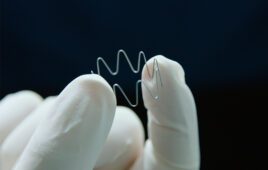
[Image courtesy of Thomas W on Flickr, per Creative Commons 2.0 license]
EMX officials say they’ve designed their real-time laser spectroscopy line of quantum cascade laser driven devices to provide early detection of diseases in a non-invasive way. They also see potential uses for the laser related to homeland security and hospital environmental monitoring.
Company officials claim their internal testing has successfully demonstrated a commercially viable laser. They say the leaders has the specific mid-IR spectrum characteristics needed to operate at room temperature. They’ve eliminated the need for a mass spectrometer, as well as other “detection only” component, to detectolatile organic compounds. The laser, they think, could provide early cancer detection in some cases, as well as spot hospital-acquired infections and the presence of explosives.
“[Volatile organic compounds] analysis has already been shown to have utility in several malignancies and pulmonary disorders, but current devices are not portable, are limited in analytic scope, and require significant delays before results are known to the physician,” said Dr. John Ruckdeschel, EMX Advanced Technologies’s chief medical officer and former director of the Moffitt Cancer Center in Tampa, Florida.
“Once fully developed, the RTLS device would represent an advancement in early detection, diagnosis and disease monitoring, which can be delivered non-invasively, in real time, in the physician’s office,” Ruckdeschel said.tion of a wide range of important [volatile organic compounds], in a single device, at a very low cost per test. The architecture and capabilities of the RTLS device are designed to go far beyond applications in the medical and health fields. Toward that end, we are currently exploring global opportunities with leading companies in each sector, that have efficient product distribution channels in place,” said Ralph Teague, EMX’s technology director and principal research scientist at Georgia Tech.
EMX isn’t the only outfit developing disease-detecting laser technology. Researchers at the University of Adelaide in Australia, for example, have developed a “laserlyzer” to detect disease in people’s breath, according to Popular Science.
EMX (Melbourne, Fla.) has reached out to larger companies to explore business opportunities around the world, according to Ralph Teague, EMX’s technology director and principal research scientist at Georgia Tech. “The architecture and capabilities of the RTLS device are designed to go far beyond applications in the medical and health fields,” Teague noted.
[Want to stay more on top of MDO content? Subscribe to our weekly e-newsletter.]




